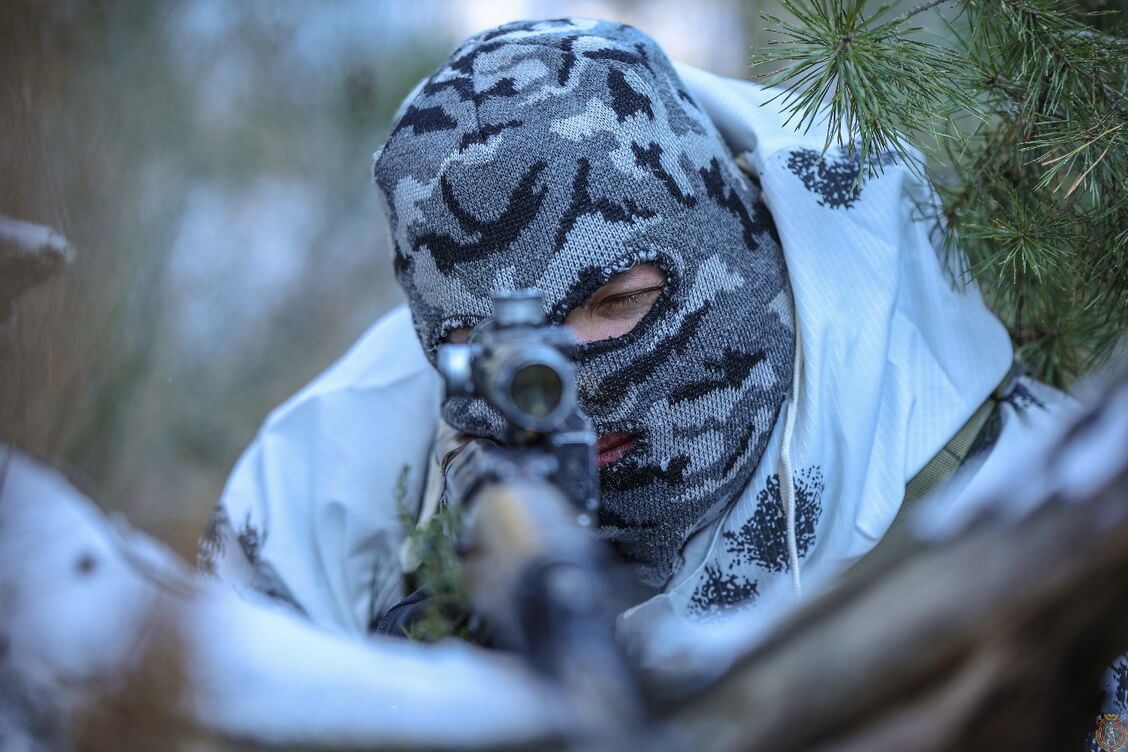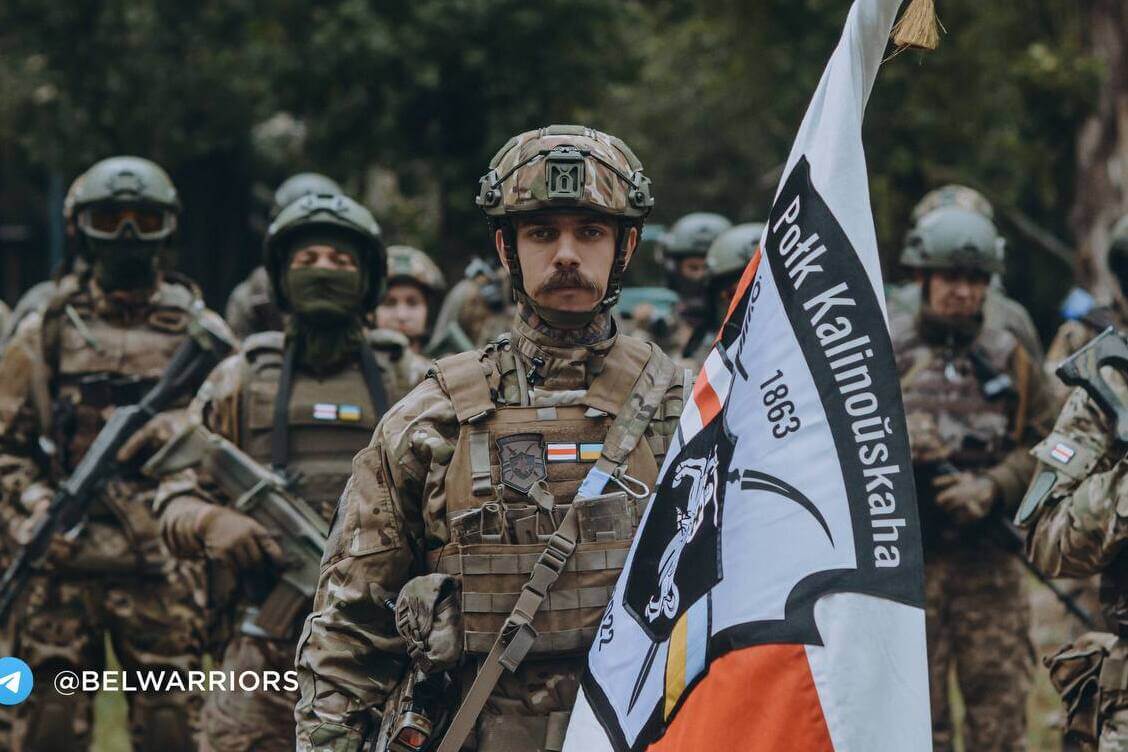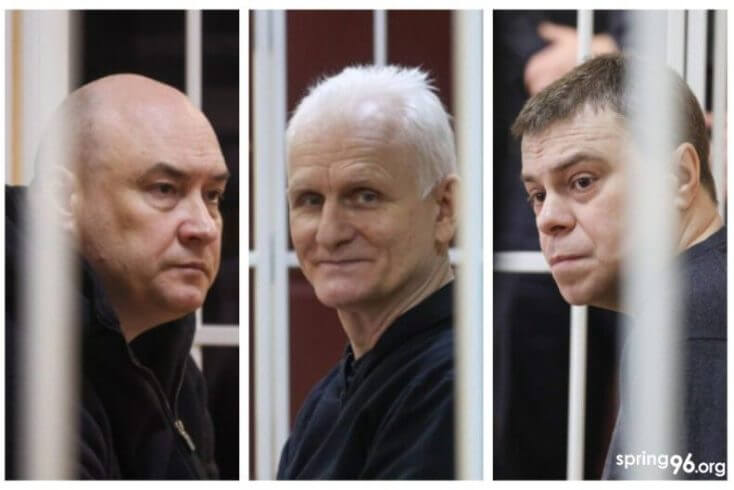Alaksandar Łukašenka likes to boast of his brief service with Soviet border troops. In the spirit of Soviet propaganda, he never misses a chance to play up threats and speculate about intrigues of the enemies “standing around the perimeter and gnashing their teeth, wishing we’d fall.” Demonizing neighbors and opponents is his trademark.

Kanstancin Mołastaŭ, chairman of the State Border Committee, reported at a government conference on January 23 that US and German troops held 12 drills in Lithuania close to Belarus’ border in 2023.
“We have a peculiar situation: there is war in the south, while Poland, Lithuania and the Baltic States in the west are even worse. I emphasize – it is even worse,” Łukašenka noted, accusing the neighbors of training militants for ousting him.
He claimed that Belarusian investigators have identified “the fighters of these units,” who are “ready to fight against their own country.”
“The military must . . . keep them, frankly speaking, in the crosshairs,” the Belarusian strongman instructed.
Threats blown out of proportion
NATO is Minsk’s favorite scapegoat. Generals clearly exaggerate threats from the alliance. A multinational battle group of about 1,500 troops and a US tank battalion of about 500 troops and three dozen Abrams main battle tanks are stationed in Lithuania, according to information from open sources. The force beefs up the Lithuanian army, which is much smaller than the Belarusian one.
Clearly, the force is too small to attack Belarus.
NATO has reinforced its eastern flank fearing an attack from Russia in the wake of the invasion of Ukraine in February 2022.
But the alliance can hardly contemplate an attack on Belarus, especially now that Moscow’s ally has Russian nuclear weapons, as Łukašenka and his generals say.
Belarus is soon to update its military doctrine to clearly define and communicate its views on the use of these tactical nuclear weapons, Defense Minister Viktar Chrenin said on January 16.
Three days later, Łukašenka claimed that after the nuclear munitions had arrived in Belarus, its western neighbors and his exiled opponents gave up on their alleged aggressive aspirations.
Minsk accuses neighbors of training militants
So, have they given up hope or are they “gnashing their teeth” preparing to attack? As usual, there is no consistency in the Belarusian leader’s statements.
On the one hand, he casts himself a member of the nuclear club, says that no one will dare to attack him. On the other, every now and then he plays the old tune about the neighbors’ invasion plans, accusing Poland of conspiring to seize half of Belarus, and NATO of plotting aggression.
On January 23, however, he expressed particular concern about military training programs for Belarusians abroad.
Several days earlier, Alaksandar Valfovič, state secretary of the Security Council, touched on the same subject on television, claiming that Poland, the Baltic States and Ukraine were training “subversive-intelligence groups and illegal armed formations” of “fugitives [opponents fleeing politically-motivated persecution] from the territory of Russia and Belarus and various criminals of all sorts.” “Normal people will not enroll in these groups,” he added.
Moreover, “Poland and the Baltic States encourage this, training them and declaring openly: ‘We’re preparing the units, combat cells,’ in order to send them, among other spots, to the territory of Belarus to carry out what they call a government overthrow in a democratic way,” Valfovič said.
Kyiv has no intention to provoke Łukašenka
In fact, officials in these countries have never said anything like that.
Last year, Waldemar Skrzypczak, a retired Polish general, suggested that the Polish government should prepare for an uprising in Belarus. “We should be ready to back the units that will carry out an operation against Łukašenka.” Belarusian state propaganda pounced on that quote.
Skrzypczak actually speculated about situations that might occur as a result of a successful Ukrainian counteroffensive, assuming that “armed Belarusians, who are part of the military potential of the Ukrainian army, will not lay down their arms. They will go to Belarus. I hope that this will spark an uprising in Belarus.”
However, the counteroffensive has stalled. Russian troops are said to be advancing as Kyiv faces problems with Western aid.
The Kastuś Kalinoŭski Regiment (KKR), arguably the biggest Belarusian unit fighting alongside the Ukrainian Armed Forces, is not planning any operations in Belarus at the moment, its leaders said at a meeting with Belarusians in Warsaw on January 21.
Deputy Commander Vadzim Kabančuk stressed that the regiment strictly follows orders from the Ukrainian command. “There are no appropriate conditions for the KKR to enter Belarus,” he said, noting that “a minor sabotage operation would be fully used by the regimes of Łukašenka and [Vladimir] Putin” for their political ends.
Commander Dzianis Procharaŭ added, “Ukraine does not need it now. We don’t want provocations.”
Indeed, Kyiv pursues a cautious policy fearing war expansion to a second front. And while Ukraine-based Russian paramilitary groups sometimes make incursions into Russia, the KKR has never carried out raids into Belarus.
Minsk makes fun of, demonizes KKR
Łukašenka claimed in June that the KKR was in a disarray. “There are less than 200 people there, maybe even a hundred today – a lot of them have died. They are in shock: ‘I want to go back. I will live in a dictatorship.’ But they can’t go back because the anti-retreat forces are behind them; they won’t let them.”

In October 2022, KGB Chairman Ivan Tertel claimed that KKR militants were planning to capture a district center, presumably Małaryta, and then, “gradually, inflicting losses on our law enforcers, move towards Minsk.”
In December, he said that seven squads of Belarusian nationals were training in Poland “to conduct terrorist attacks and seize objects on Belarus’ territory.”
Apart from the Ukraine-based units, Belarusians are said to have set up a network of sports and patriotic clubs in Poland and Lithuania known as Paspalitaje Rušeńnie.
In February 2023, ex-leader Siarhiej Kiedyška estimated its total strength at 150 people. In October, its spokesman Siarhiej Biaspałau mentioned “almost 400 volunteers,” but added that some people were leaving and that the Gdansk cell had ceased to exist.
Members of the paramilitary group openly say that they are ready for armed struggle against Łukašenka when the conditions are right. But now and in the foreseeable future they are not the kind of forces that can invade Belarus. Besides, Warsaw and Vilnius would not give the go-ahead for any incursions because they are afraid to provoke Russia.
Poland, the Baltic States and other European countries are increasingly anxious about a possible Russian invasion. Baltic countries are not sure if NATO comes to their rescue if Russian and Belarusian tanks break through the Suwałki Gap.
Dictator’s besieged fortress
Minsk exaggerates threats emanating from NATO and Belarusian fighters because it needs to justify militarization and the presence of Russian nuclear weapons in Belarus. Creating a besieged-fortress atmosphere is an old trick many dictators use.
After all, Łukašenka can blame “enemies” for his brutal crackdown on dissent and no-choice elections, which are in fact a special operation conducted by fully armed security forces.
Łukašenka is not a madman to really want to start a war with NATO, but he has to follow the footsteps of the Kremlin, which has clashed with the democratic world.
And the Belarusian ruler’s recent anti-Polish tirades may indicate that he is no longer holding out hope for concessions from the new government in Warsaw.



